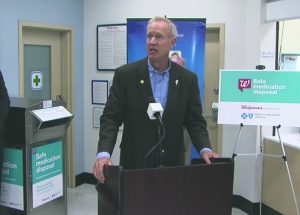State touts drop-off kiosks to get rid of unused opioids
By Kevin Beese Staff Reporter — October 15, 2018
Laura Minzer, executive director of health policy for Blue Cross Blue Shield, talks at an Oct. 2 press conference in Bloomington about the importance of patients not only knowing how to use prescribed medication properly, but how to dispose of those drugs when done using them. (BlueRoomStream.com)
Kiosks have been installed at dozens of Walgreens throughout Illinois in an effort to keep prescription drugs out of the wrong hands.
A public-private partnership established the kiosks at 83 Walgreens stores in the state to safely dispose of opioids.
Walgreens has already partnered with Blue Cross Blue Shield and pharmaceutical companies to address the national opioid abuse crisis.
Laura Minzer, executive director of health policy for Blue Cross Blue Shield, said it is important for patients to know how to properly use prescriptions, but also how to properly disposal of those drugs when done using them.
Minzer noted that a survey of Blue Cross members conducted last year found that one-quarter of respondents still had unused prescription opioids in their possession.
“Unused opioid prescription medications that end up in (disposal kiosks) are prescription medications that don’t go accidentally used or intentionally misused by loved ones, family, friends and members of the community at large,” Minzer said at an Oct. 2 press conference in Bloomington about the drug take-back initiative.
Gov. Bruce Rauner labeled the opioid problem in the state “devastating.”
“These kiosks can help save lives,” Rauner said. “In so many communities, young people or those who may be mistakenly or intentionally trying to get access to addictive drugs will go into medicine cabinets and take them.”
Rauner encouraged residents to only have safe medications accessible and to keep any medicine that can be addictive, like opioids, in a secure location.
“If any medication is not needed, it should be safely and securely disposed of,” Rauner said.
He said unused opioids can stay in a medicine cabinet for months or years and still be very dangerous, and then end up in the wrong hands. The governor called the prescription drugs “stunningly addictive.”
“We’ve got to come together to combat it and reduce the risk of death and injury due to overdose of opioids,” Rauner said. “Opioid overdoses have taken 11,000 lives of fellow Illinoisans over the last 10 years. It is a scourge that we must stop.”

Gov. Bruce Rauner stands in front of the drug-disposal kiosk at a Bloomington Walgreens. There are kiosks at 83 Walgreens stores in the state that can be used for disposing of unused prescription drugs. Rauner said getting rid of the drugs keeps them from winding up in the wrong hands. (BlueRoomStream.com)
He said the state’s Opioid Epidemic Task Force has continued to make recommendations for stemming the crisis.
“This is a public-private partnership to end this scourge,” Rauner said. “We need to address the mental health issues that often drive the addiction issues.”
He said a $2 billion allocation from the federal government will help enhance mental health services across the state. The governor said the federal money would help the state be more proactive in addressing mental illness and mental health disorders.
Rauner said the kiosks would increase public safety and improve health care quality.
Through more than 1,000 medication disposal kiosks already established in other states, Walgreens has collected more than 270 tons of unwanted medication so far, according to Julie Bickers, healthcare supervisor for Walgreens over Central and Southern Illinois.
“We firmly believe that it will take parties from the private and public sector to help find solutions that address this epidemic,” Bickers said.
State Rep. Dan Brady (R-Normal) said that the kiosks are just one step being taken to try to address the opioid problems facing Illinois.
State Sen. Jason Barickman (R-Bloomington) said the opioid problem has become a national issue.
“This opioid epidemic is something that is not unique to Illinois; it’s not unique to Central Illinois,” Barickman said, “but it has plagued us in a manner that requires our attention.”
He said the bottom line is that the opioid epidemic has hit every community across the state and that lawmakers need to do something about it.
kbeese@chronicleillinois.com
— State touts drop-off kiosks to get rid of unused opioids —-



